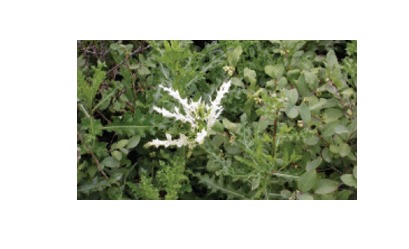A beautiful, weed-free lawn can be the envy of the neighbourhood. And it could be yours – without the hours of weeding.
A new product is on the market that kills weeds – but not your grass. Dr. Karen Bailey, an Agriculture and Agri-Food Canada (AAFC) scientist at the Saskatoon Research and Development Centre (now retired) and her team successfully isolated and purified a fungus called Phoma macrostoma that naturally infects and can successfully control dandelion, Canada thistle, clover, and other broad-leafed weeds.
“We are excited this product will be soon available for home-owners and gardeners alike,” said Dr. Russell K. Hynes, a microbiologist at AAFC’s Saskatoon Research and Development Centre.
Developed so it can be applied similarly to granular fertilizers, Phoma macrostoma gets absorbed into the soil, enters weed roots, and infects the entire plant causing it to lose its ability to feed itself. The plant turns white because of its lack of chlorophyll and dies. If applied before weeds emerge, they come up white and die before becoming established.
AAFC researchers have long been interested in developing pest controls derived from natural organisms with little or no impact beyond the designated target. These naturally-occurring controls tend to have lower risk to people and the environment and this fungus is no exception.
Hynes and Bailey found that this fungus does not compete with other naturally-occurring soil organisms and stays within five centimetres of where it was applied, so it is not a risk to animals or other plants. And the population declines over time to the extent that 12 months following an application, the fungus is no longer detectible in the soil. Even field crops like peas, which would normally be susceptible to the fungus, will not be affected if planted a year after the application.
Recently, Premier Tech, a leading producer in pest control products, signed a licencing agreement with AAFC to commercialize this product. The Phoma bioherbicide is currently registered for domestic use to control dandelion and other broadleaved weeds in non-edible plants like turf grass.
“We know that there is even more potential for this product in the agriculture sector. That is why I am currently picking up the reins (from Bailey) and am continuing research to someday expand on the Phoma label to include edible crops such as wheat, barley and corn,” explains Hynes.
Beware dandelions and thistles! Phoma macrostoma will be coming soon to a field near you.
Article and photo supplied by AAFC. Find more research stories from AAFC here.
